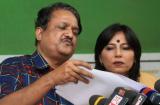
Mumbai, October 19: Former IPS officer turned lawyer cum activist Y P Singh, on Thursday, launched a frontal attack on Union Agriculture Minister Sharad Pawar, his daughter Supriya Sule and nephew Ajit Pawar, charging them of usurping hills near Pune at dirt-cheap price to construct ultra-swanky Lavasa township.
In a packed press conference, Singh presented documents to substantiate his allegations interspersed with caustic remarks against India Against Corruption (IAC) key member Arvind Kejriwal, whom he subtly compared with 'German dictator Adolf Hitler.'
However, at the outset, Singh clarified that the conference was not called 'to attack Kejriwal but to expose an important scam involving Pawar family in the construction of Lavasa spread over 3,000 acres and reportedly involving an investment of Rs 3,000 crore.
Brandishing documents procured through RTI, Singh said that scrutiny of papers reveal that former Maharashtra Deputy Chief Minister Ajit Pawar, under the guise of irrigation project, first allotted 341 acres of land to real estate firm 'at throwaway prices,' on 30 years’ lease for just Rs 23,000 a month.
“And who were the beneficiaries? The beneficiaries were Ajit Pawar's cousin and Sharad Pawar's daughter Supriya Sule and her husband Sadanand Sule... 20.81 per cent shares belonged to Supriya and Sadanand in Lake City Corp formed to construct Lavasa....which means Supriya had at least 10.4 per cent shares...and Ajit Pawar had given this land almost free to the company... All this in the name of irrigation project.”
Singh, who has been waging a legal battle for activists, including Medha Patkar, against the construction of Lavasa township for the past several years, traced the history of the controversial manicured hill-township, alleging that in 2002 the then Principal Secretary of the Revenue Department Ramesh Kumar (IAS) had questioned the transaction, demanding an inquiry into the matter. Strangely, the then Revenue Minister Narayan Rane, after tom-tomming about the inquiry in public quietly buried the case.
“In 2006, Supriya and Sadanand sold their stake in the company which later became Lavasa Corporation and in 2009 when Supriya had to declare her assets as a Member of Parliament, she informed that she was worth Rs 15 crore...this figure cannot be correct as Axis Bank in its evaluation of Lavasa Corporation had pegged its value at Rs 10,000 crore which would mean her 10 per cent and her husband's 10 per cent would be probably worth several hundred crores...and if this is true then it reeks of a huge money-laundering exercise,' Singh argued.
Singh pointed out: “...there are several things we have uncovered recently. In 2009, Sharad Pawar and Ajit Pawar met senior bureaucrats at a guesthouse within Lavasa township. And our information indicates that the Lavasa Corporation was allowed to add floors to the buildings by granting them extra FSI (floor space index.) The question here is under what jurisdiction Union Agriculture Minister met state bureaucrats?
“Thereafter, Sharad Pawar along with his nephew Ajit met the then Chief Minister along with some bureaucrats, wherein it was decided to grant Lavasa a global floating FSI...and Ajit was the irrigation minister at the time. And despite my providing all these facts to Kejriwal...he has not bothered to highlight them and, thus, this press conference,” he said





Comments
Add new comment